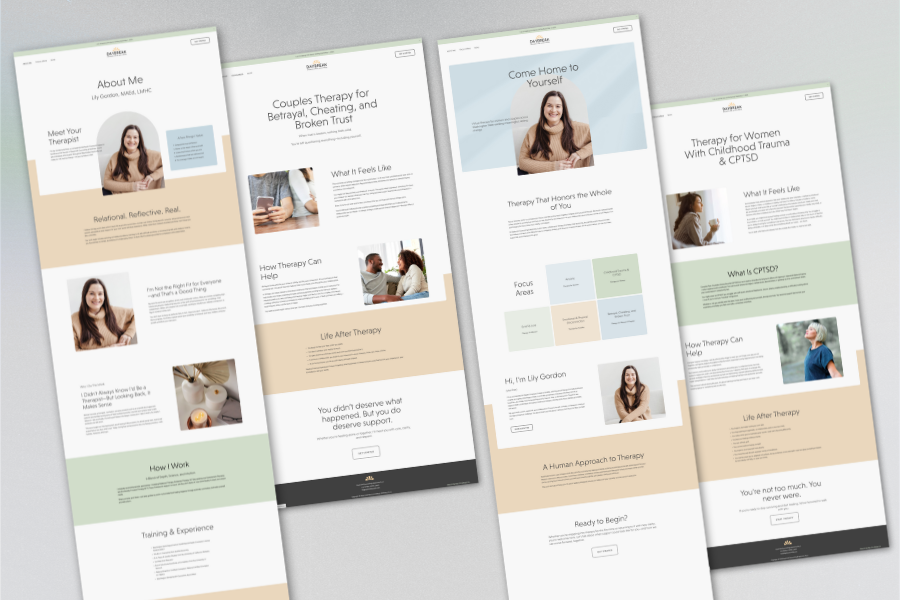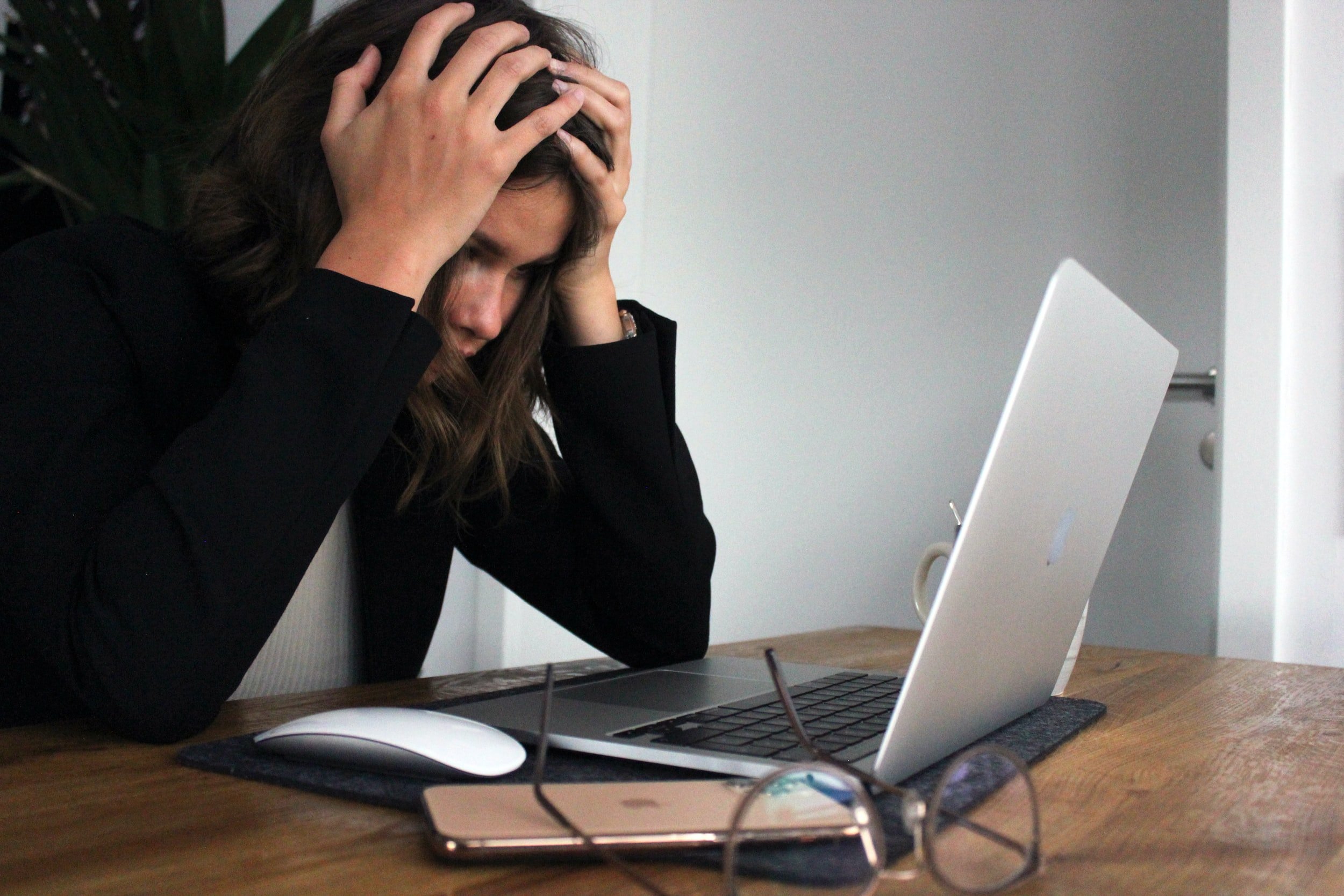Do I Really Need a Website? The Real Cost—and Return—of Investing in a Custom Therapy Website
Do I Really Need a Website? The Real Cost—and Return—of Investing in a Custom Therapy Website
Quick Answer for Skimmers (and Search Engines):
You don't need a website to be a successful therapist—but if you're ready to attract clients, streamline onboarding, or build trust online, a well-made site can pay for itself in just a few sessions and deliver returns for years to come.
Why this matters:
Some therapists thrive without a site—but if you want one that truly works for you, it needs strategy, not just design. This post breaks down the real costs (DIY vs. template vs. fully custom), the value it can bring, and how to make your investment work smarter—not harder.
If you hang out in any therapist Facebook group for more than a day, you’ll see the same questions pop up again and again:
“How much does a website cost?”
“Do I really need one to start a private practice?”
Let’s cut to the chase: You don’t need a website to have a successful practice. But if you want one, or if it’s going to be one of your primary marketing tools, it’s worth getting clear on exactly what you’re investing in—and what kind of return you can expect.
Let’s break it all down.
Do You Need a Website to Be a Successful Therapist?
Nope.
Some therapists run full caseloads without ever building a website. If you’ve got a strong referral network, a solid Psychology Today profile, and a marketing strategy that works for you, then a website might be more of a “nice to have” than a “must.”
But there are a few scenarios where having a website becomes especially helpful:
You’re private pay or out-of-network and need to actively attract your ideal clients
You’re niching into a specific population or specialty and want to stand out
You’re offering virtual therapy and need a stronger online presence to build trust
You want to streamline onboarding with forms, FAQs, scheduling, etc.
You want to reduce or eliminate reliance on social media or third-party platforms
You don’t want to do other kinds of marketing — this one’s big.
Here’s a personal example: I focus about 90% of my marketing energy on my website and SEO. The rest? Occasional postcard mailings to healthcare providers and popping into Facebook groups when it feels right. If I have time, I might join a local networking group. But for the most part, my site does the heavy lifting. And I like that. If you’d rather spend time building a great website than cold-emailing doctors or dancing on Instagram, that’s a valid choice.
What’s the Purpose of Your Website? (And Why That Matters)
Before asking how much a website costs, ask what job you’re hiring it to do. Most therapist websites fall into one of these roles:
Client Magnet
Built to rank in search engines, speak directly to your ideal client, and convert visitors into inquiries. This kind of site needs strong copy, SEO, and clear calls to action.
Online Business Card
A minimal site for credibility and visibility. You might only share your contact info and specialties here. It’s not doing much “selling,” but it creates a professional online footprint.Onboarding Tool
A site designed to support clients who already found you elsewhere. You may use it to share forms, answer FAQs, link to booking systems, and reduce admin time.Referral Builder
A place for colleagues and healthcare providers to learn about your work and refer the right clients. These sites often focus on professional credibility, niche clarity, and trust-building.Education/Content Hub
Some therapists want a space to share blog posts, resources, or guides that demonstrate thought leadership or support a broader mission.
Your site can be one or a blend of these—but knowing what you need it to be will help you determine whether a given investment is worth it.
How Much Does a Website Actually Cost?
Let’s talk numbers. Here’s a rough breakdown of what you might expect to pay:
DIY Website (Platform + domain/hosting):
$100–$500/year
Good if you’re tech-comfortable and have time to learn.Template + Semi-Custom Support:
$300–$1,200
A step up that saves time and offers more polish. (👋 That’s what I offer in my template shop.)Fully Custom Website:
$3,000–$6,000+
This typically includes branding, strategy, copy, design, development, and SEO setup. Worth it if you want to go all in—but only if the site is aligned with your actual goals.
The wide range in pricing isn’t about someone charging “too much” or “too little”—it’s about how much work and strategy is being built into the site.
So… What’s the Return on Investment? (Let’s Do the Math)
Let’s say you invest in a custom website:
Cost: $5,000
Your ongoing website costs:
Squarespace hosting: $23/month = $276/year
Domain: $20/year
Total annual upkeep = $296
Your session rate: $195
You see around 15 clients per week
Year 1: How many sessions cover your investment?
Initial website investment + year 1 hosting/domain = $5,296
$5,296 ÷ $195/session = ~27 sessions
That’s about 7 months of sessions with one client. Very doable.
Year 2 and Beyond: Ongoing Cost = $296/year
$296 ÷ $195 = ~1.5 sessions per year
After year one, your only cost is about one session and a half per year. That’s it.
Now, let’s talk return.
Let’s say your website brings in the majority of your clients—around 90%, and you average 15 sessions/week:
Weekly income: 15 × $195 = $2,925
Annual income: $2,925 × 52 = $152,100
If even half of your caseload came from your website, that's $76,050 in client revenue directly supported by that one-time investment.
The takeaway?
If your website does a good job of attracting and converting clients, it can easily pay for itself in just a few sessions—and then keep delivering returns, month after month, year after year.
It’s not magic. But when your site is strategic, aligned with your niche, and paired with some basic visibility efforts (like SEO or networking), it can become one of the most cost-effective parts of your entire business.
If You’re Going to Invest, Make it Count
The saddest thing is when someone pays thousands for a beautiful site… that no one sees or uses. Here’s how to avoid that:
Get clear on your site’s role (magnet, onboarding, etc.)
Invest in clear, client-centered copy and SEO basics
Build your marketing plan around your site—not in place of it
Choose a designer (or template) that aligns with your goals, not just your aesthetic
A Website Isn’t Your Whole Marketing Plan (But It Can Be a Big Part)
A website is a tool—not a magic wand. It works best as part of a strategy that includes things like:
Referral relationships
Directories (Psychology Today, Therapy Den, etc.)
SEO
Social media (if you like it)
Local outreach (like postcards or networking)
You don’t need to do all of those things, but you do need to do something. The best marketing strategy is one that feels sustainable and authentic for you.
Final Thoughts: You Get to Choose What Works for You
If you’re wondering whether to invest in a website, ask yourself:
Do I want my website to do active work for me (attract clients, build trust, support referrals)?
Would I rather spend time writing and building online than doing other types of marketing?
Does my current marketing strategy need something more to get me to a full caseload?
If the answer is yes to any of those, a thoughtfully built website might be a smart next step.
Need a Website That Works for You (Without Starting from Scratch)?
I design therapist-specific website templates that are strategically built to attract and convert the right clients. If you're ready to make your website work harder for you—not the other way around—check out my template shop and my custom site option.
Pin it!
Some of My Favorite Private Practice Tools
Resources and Referral Links















































